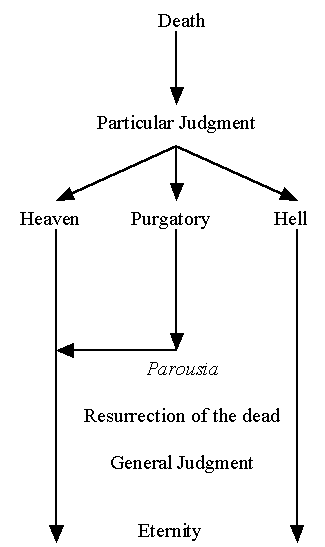Catholic Christians believe that all men and women will experience the end of this human life. The Word of God teaches us that each person will be judged immediately after death.
Catholics believe that the souls of the saved who are in need of further purification before facing God will be purged in purgatory.
Heaven awaits those souls found to be in the state of grace or perfection.
Hell or eternal damnation awaits those souls who die without repentance for their sins.
At the end of the world, Jesus will come again in power and glory--the Parousia.
At this time the bodies of all the dead will be resurrected.
Those still living will be taken up into the air to meet Jesus. General judgment of all people will then be made.
The blessed will possess heaven for all eternity; the damned will suffer hell for all eternity.
Catholic Christians are so aware of the Biblical theme of the last things of this life that they devote four weeks every year to a special time--Advent--a season for the faithful to listen again to the Word of God on the end of this life and the Second Coming of Jesus in glory and judgment.
All professed Christians look to the Bible for their acceptance and understanding of the end of human life and what follows human death. The study of last things is called eschatology from the Greek word eschatos, meaning "the last or extreme."
The stages of escatology include individual human death, particular judgment, the choices of heaven, purgatory or hell, the end of the world, the living being "taken up," the resurrection of the body, the Second Coming of Christ, general judgment, and the New Creation.
Christians accept that the first of the "last things" of human life is physical death. Natural death is the separation of the immortal soul from the physical body. Divine Revelation tells us the origin of human death--the sin of Adam and Eve. The punishment for the original sin is found in Genesis.
Gen 3:19
By the sweat of your face shall you get bread to eat, Until you return to the ground, from which you were taken; For you are dirt, and to dirt you shall return.
THE REAL PRESENCE

“I am the bread of life. Your fathers ate the manna in the wilderness, and they died. This is the bread which comes down from heaven, that a man may eat of it and not die. I am the living bread which came down from heaven; if any one eats of this bread, he will live for ever; and the bread which I shall give for the life of the world is my flesh." The Jews then disputed among themselves, saying, ‘How can this man give us his flesh to eat?’ So Jesus said to them,


2 comments:
Q. 1380. Will the damned suffer in both mind and body?
A. The damned will suffer in both mind and body, because both mind and body had a share in their sins. The mind suffers the "pain of loss" in which it is tortured by the thought of having lost God forever, and the body suffers the "pain of sense" by which it is tortured in all its members and senses.
Q. 1383. Are the souls in Purgatory sure of their salvation?
A. The souls in Purgatory are sure of their salvation, and they will enter heaven as soon as they are completely purified and made worthy to enjoy that presence of God which is called the Beatific Vision.
Post a Comment